






























































It is my privilege to present the 2024 Annual Report of the New York State Office of the Workers’ Compensation Fraud Inspector General (WCFIG). This report reflects the dedication of our office to advancing integrity, accountability, and public trust in New York’s workers’ compensation system. Every investigation, training, and outreach effort we undertake isguidedbythefundamentalbeliefthatthis systemisacriticalsafetynetforNewYork’s workforce.
Duringthepastyear,theworkofourWCFIG team resulted in numerous criminal prosecutions, significant restitution for the state, and the uncovering of almost 30% moreworkers’compensationfraudthanlast year. These outcomes are a testament to the dedication of our staff, strong partnerships with prosecutorial, law enforcement, and regulatory agencies, and the value of a collaborative, data-driven approachtooversight.
Central to our mission is also outreach and public engagement. WCFIG continued to expand its efforts through statewide trainings, public events, and media engagement, while strengthening its digital presence to educate New Yorkers about workers’ compensation fraud and how to report it. Our outreach is not only preventive, it’s participatory, empowering the public to play a part in identifying and hold
holding accountable those bad actors who would seek to divert valuable resources intendedforthosetrulyinneed.
InNovember,wewerealsoexcitedtohaveour WCFIG Triage Team honored with the prestigious John J. Kennedy Award by the New New York Anti-Car Theft and Fraud Association. This honor recognized the unique approach this office put into place to comprehensively and efficiently evaluate these matters and affirmed the extraordinary impact of our team's work in strengthening the integrity

Lucy Lang
integrityoftheworkers’compensationsystem.
As we look ahead, WCFIG will continue to evolveinresponsetotheshiftingchallengesin the workers’ compensation landscape, including those posed by an increase in remotework.Withrenewedresolve,weremain committed to deterring fraud and reinforcing public confidence in a system relied upon by hundreds of thousands of our fellow New Yorkers.

The mission of the Office of the New York State Workers’ Compensation Fraud Inspector General (WCFIG) is to conduct and supervise investigations of possible fraud and other violations of the laws, rules, and regulations pertaining to New York State’s workers’ compensation system. Through its investigations, audits, and reports, WCFIG reduces costs to the workers’ compensation system by combating fraud and improving the efficiency and effectiveness of the system. WCFIG’s investigations are complex and often involve detailed record analysis and interviews of employers, employees, health care providers, and insurance carriers. These investigations can result in criminal referrals, arrests, and prosecutions, as well as recoveries of restitution.
2024 marked Lucy Lang’s third full year as the New York State Workers’ Compensation Fraud Inspector General, having been appointed to the role by Governor Kathy Hochul on December 3, 2021. Throughout 2024, Inspector General Lang and her staff continued to conduct numerous in-person trainings and outreach presentations to organizations and key stakeholders in the workers’ compensation system, including local, state, and federal agencies, private carriers, and fraud prevention coalitions.
$2.7 Million IN WORKERS’ COMPENSATION FRAUD UNCOVERED 28.4% compared to 2023
1,436 COMPLAINTS
14 ARRESTS


As a result of these efforts and other proactive initiatives, WCFIG received 1,436 complaints in 2024. The investigations conducted by WCFIG in 2024 led to 14 arrests and uncovered more than $2.7 million in workers’ compensation fraud. Additionally, criminal convictions and civil dispositions stemming from WCFIG investigations resulted in more than $1.4 million in fines and restitution for defrauded New York State agencies, insurance carriers, medical providers and employers. The number of arrests, amount of fraud uncovered through investigations and amountofrestitutionawardedthroughconvictions representincreasescomparedto2023.
New York State Workers’ Compensation Law section 136 mandates that WCFIG annually submit a report to the Governor and the Chair of the Workers’ Compensation Board that summarizes the activities of the office for that calendar year. Consistent with that statutory mandate, this annual report outlines the mission of WCFIG, describes the operational and administrative actions implemented by the office, and provides a summary of significant prosecutions that resulted from the office’s investigations in 2024. This report also provides information about WCFIG’s new and continued strategic partnerships with law enforcement partners, state agencies, insurers, and employers.
WCFIG is responsible for protecting and promoting the integrity of the New York State workers’ compensation system, which provides cash benefits, medical care, or both, to workers who are injured or become ill as a direct result of their employment. Claims for compensation are adjudicated by the New York State Workers’ Compensation Board. Appeals from decisions by the Workers’ Compensation Board are brought to board panels and full boards within the workers’ compensation system. Ultimately, appeals can be brought to the New York State Supreme Court Appellate Division, Third Department.
Pursuant to New York State Workers’ Compensation Law section 136, WCFIG is vested with the authority to investigate fraud and other violations of the laws, rules, and regulations relating to the workers’ compensation system, and to refer matters to federal, state, and local prosecutors or other appropriate law enforcement agencies for further investigation and criminal prosecution. In addition, WCFIG may refer matters to administrative entities, the New York State Insurance Fund, and other insurance carriers for investigation and/or audit. As part of its mission, WCFIG may also recommend legislative and regulatory changes to strengthen the workers’ compensation system.
WCFIG is supervised by an Attorney-in-Charge and a Managing Investigator.
Bryan Richmond is a seasoned attorney with extensive experience in workers’ compensation TKT
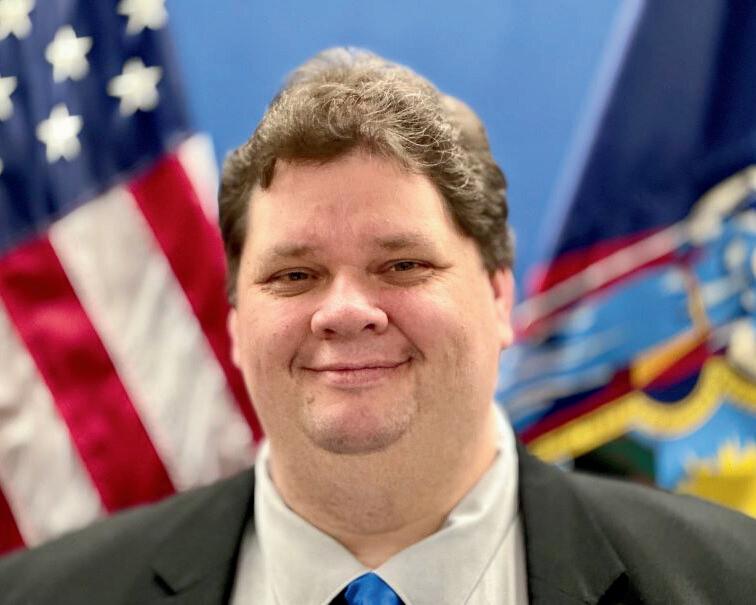
Attorney-in-Charge
law. In this role as WCFIG’s attorney-in-charge, he oversees all aspects of the office’s statewide investigations, from complaint intake to prosecution. Richmond also leads WCFIG’s specialized training efforts, fraud prevention initiatives, and coordination with interagency task forces and prosecutorial partners throughout the state. Prior to joining the office in 2019, Richmond spent more than a decade in private practice, where he represented municipalities, insurers, and their insureds in Workers’ Compensation matters and other areas of civil litigation. Richmond’s expertise is instrumental to TKT WCFIG’s work safeguarding New York State’s workers’ compensation system and holding accountable those who seek to defraud it.
Jane Seely brings over two decades of experience in fraud detection to her role leading WCFIG
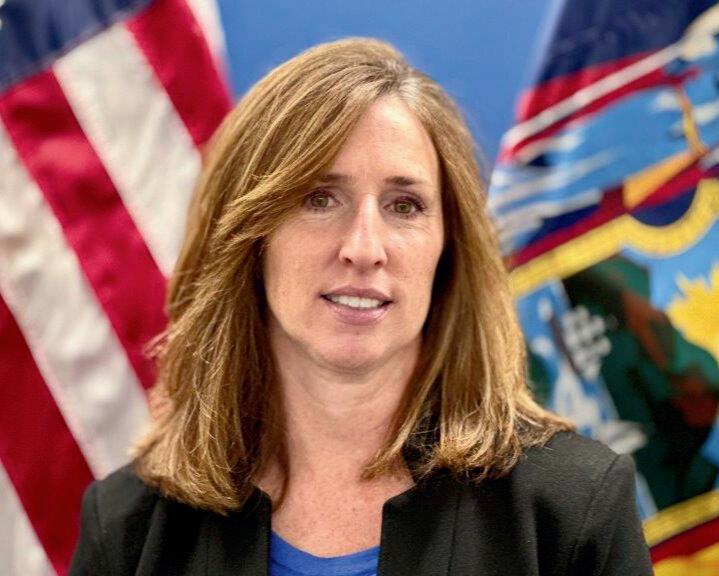
WCFIG investigations. Since joining the office in 2000, she has led complex investigations into fraudulent activities within the state’s workers’ compensation system. In her position, Seely also manages the WCFIG triage team, coordinates case assignments, and works closely with local, state, and federal law enforcement agencies to preserve the workers’ compensation system as a lifeline for those who need it most Seely’s expertise in investigative techniques, evidence analysis, and data gathering has been instrumental in strengthening WCFIG’s efforts.
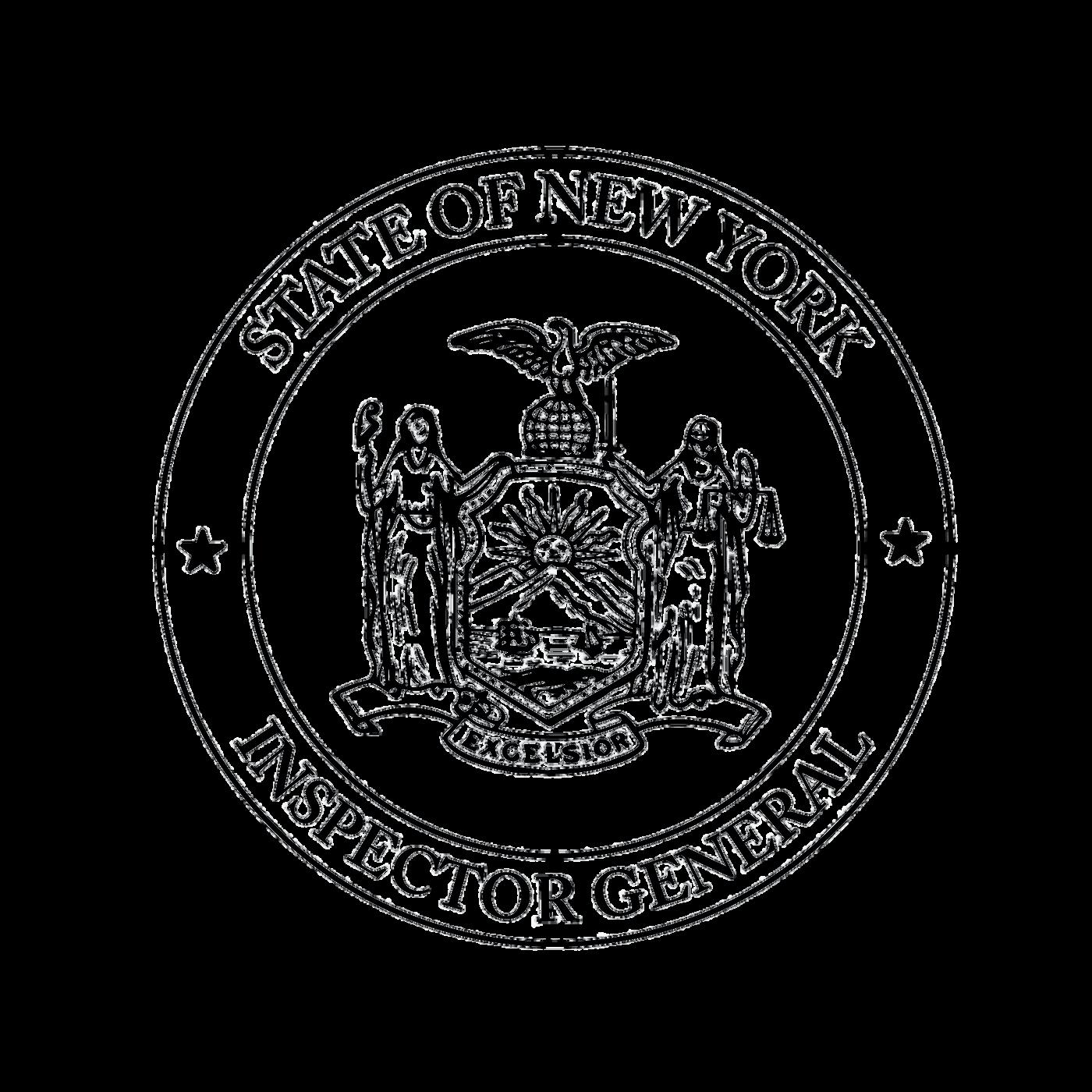
WCFIG investigations usually begin with either the lodging of a complaint alleging workers’ compensation fraud or the identification of potential fraud by the Inspector General in the course of WCFIG’s proactive initiatives. There are generally three types of fraud allegations received by WCFIG:
Fraud by medical providers and/or other professionals, including but not limited to physicians, physician assistants, medical billers, law judges, attorneys, court reporters, and insurance professionals
Fraud by employers who are required to maintain workers’ compensation insurance coverage for their employees but who fail to do so, have inadequate coverage, or misrepresent the number and classification of individuals employed on their payroll in the insurance application process
Fraud by claimants resulting in the receipt of benefits to which they are not entitled
Complaints received by the Offices of the New York State Inspector General regarding the workers’ compensation system are handled in a comprehensive and systematic way. Each of the more than 6,000 complaints received by the agency annually via telephone, online, email, mail, and by hand are logged and reviewed by the Case Management Unit. WCFIG complaints are then referred to the WCFIG Triage Unit, an internal group formed in 2018 in response to the growing number of workers’ compensation fraud complaints. This unit, which is headed by the Attorney-In-Charge for Workers’ Compensation Fraud, Bryan Richmond, and the Managing Investigator for Workers’ Compensation Fraud, Jane Seely, includes investigators and an investigative nurse and conducts a preliminary investigation and analysis of the matters alleged.
Based on the results of the Triage Unit review, certain complaints are referred to another government agency or insurance carrier for further action, or to a WCFIG team for further investigation. Cases opened by WCFIG for full investigation are assigned to multi-disciplinary teams led by an investigative counsel who is assisted by investigators, investigative auditors, medical professionals, and computer forensic specialists. The investigations are supervised by both the Attorney-in-Charge for Workers’ Compensation Fraud and a regional Deputy Inspector General. Acting under WCFIG’s statutory authority, the investigative teams may subpoena witnesses, take sworn testimony, and compel the production of relevant records.
Following a WCFIG investigation, findings may be referred for prosecution to district attorneys across New York State, the New York State Attorney General’s Office, or the United States Attorneys’ offices. Referrals may also be made to investigative offices within the New York State Workers’ Compensation Board for enforcement action such as the revocation of a medical provider’s authorization to treat workers’ compensation patients or the issuance of “stop work” orders against non-compliant businesses for failure to secure appropriate workers’ compensation insurance. In other cases, the investigative findings may be referred to insurance carriers such as the New York State Insurance Fund, which can initiate civil litigation or administrative proceedings, including the reduction or suspension of workers’ compensation wage indemnity benefits to claimants engaging in fraudulent or inappropriate conduct. Investigations may also be closed as unsubstantiated.
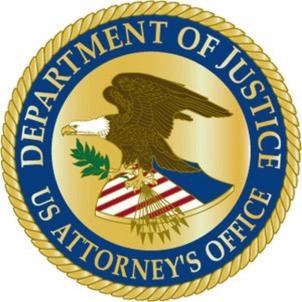
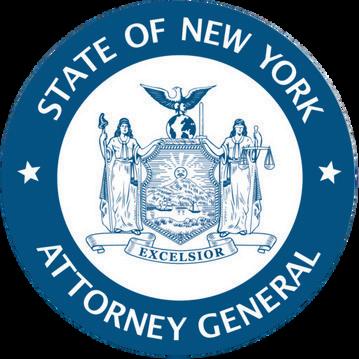

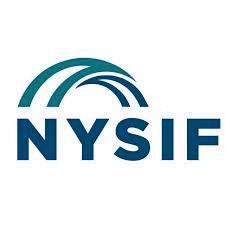
WCFIG investigations initiated in 2024 led to criminal charges against 14 people. One of these matters involved professional fraud by a medical biller, three of these matters involved employer fraud, and the remaining ten involved claimant fraud. Of these 14, five resulted in convictions, one resulted in a non-prosecution agreement and eight matters are still pending as of the end of 2024.
Several criminal prosecutions initiated in prior years also concluded in 2024, resulting in criminal convictions of an additional five people. Overall in 2024, WCFIG investigations uncovered more than $2.7 million of workers’ compensation fraud. Additionally, criminal convictions and civil dispositions stemming from WCFIG investigations resulted in more than $1.4 million in fines and restitution for defrauded New York State agencies, insurance carriers, medical providers and employers. Below are summaries of several of the WCFIG investigations that resulted in criminal convictions in 2024.
In restitution, fines, and other court orders resulting from WCFIG investigations. $1.4+ Million
In 2024, WCFIG continued its investigations of medical providers and other professionals whose job responsibilities are integral to the proper administration of the workers’ compensation system. These professionals may include:
Provider and professional cases are often complex and involve long-term investigations. As a result of WCFIG’s investigations in 2024, several matters were referred to both licensing agencies and the Health Provider Discipline Unit of the Workers’ Compensation Board resulting in the loss of certifications. Several other investigations involving medical providers and other professionals are ongoing. One case resulted in the arrest and prosecution by the New York State Attorney General of a scheme to defraud by a medical biller.

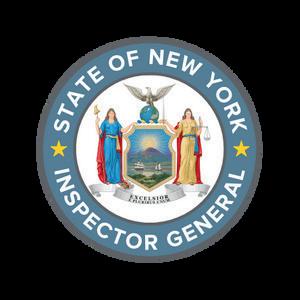
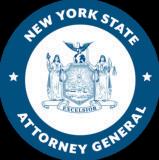
In January 2024, following a joint investigation by WCFIG, the New York State Insurance Fund and the New York State Attorney General, the owner and operator of Medlink Services, Inc. and Medlink Partners, LLC, a medical billing agent for a Brooklyn-based orthopedic practice, was arrested and charged with 27 counts including Insurance Fraud in the First Degree; Grand Larceny in the First, Second and Third Degrees; Forgery in the Second Degree; Scheme to Defraud in the First Degree; Falsifying Business Records in the First Degree; and Workers’ Compensation Fraud. The investigation found that from January 2012 through January 2019, the medical biller abused his position by diverting to his companies payments that were intended for surgeons who provided health care services to workers’ compensation claimants. Through a series of fraudulent submissions, the medical biller diverted more than $1.9 million from 13 insurers, including more than $1.3 million from the New York State Insurance Fund alone, intended as payments to surgeons for care to patients injured in work-related accidents.


In 2024, WCFIG continued its investigations of employers within New York State who fail to maintain appropriate workers’ compensation insurance for their employees as mandated by New York State Workers’ Compensation Law, or who misclassify their employees to reduce the cost of their insurance. Fraud by employers adversely impacts both the residents and the economy of New York State by placing injured employees at risk and placing honest employers on an uneven playing field with those competitors who do not provide their employees with the requisite insurance. WCFIG’s investigations in 2024 of workers’ compensation fraud by employers resulted in three arrests.

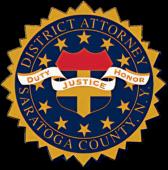
In November 2024, the owner of a Saratoga-based paving company was arrested and charged with the Workers’ Compensation Law crime of Failure to Secure Compensation following

In 2024, WCFIG also continued its investigations of workers’ compensation claimants who defraud the workers’ compensation system by falsely reporting their work status or activities or who are otherwise collecting benefits to which they were not entitled. Fraud by claimants increases the costs of insurance to New York State employers and erodes the public’s trust in the workers’ compensation system. In 2024, WCFIG’s investigations related to claimants who fraudulently collected workers’ compensation benefits resulted in ten arrests. following an investigation conducted by WCFIG. The investigation found that the owner was operating a business with multiple employees but failed to obtain workers’ compensation insurance coverage. Consequently, when one of his employees sustained an on-the-job injury to his hand, the New York State Uninsured Employers’ Fund, a fund administered by the New York State Workers’ Compensation Board, assisted the injured injured worker in the payment of medical expenses and lost wage workers’ compensation benefits. While outside of this reporting period, in March of 2025 the owner pled guilty to Failure to Secure Compensation under Workers’ Compensation Law § 52 and paid restitution to the New York State Uninsured Employers’ Fund.

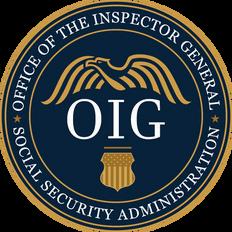
In March 2024, a New York State Department of Corrections and Community Supervision (DOCCS) correction officer was arrested following a joint investigation by WCFIG and the U.S. Social Security Administration (SSA) Office of the Inspector General. The investigation found that the correction officer, after claiming to have sustained an injury while working at Wende Correctional Facility, was out of work from DOCCS and collecting lost wage benefits from the New York State Insurance Fund (NYSIF). During this same time, the correction officer was also receiving Social Security Disability benefits from the SSA. However, the investigation found that the correction officer was working as a bus driver on a route between Buffalo and New York City during this period and collecting wages, which he concealed from NYSIF, the Workers’ Compensation Board, and the SSA. Following a prosecution by the Erie County District Attorney’s Office, the correction officer pled guilty to Insurance Fraud in the Third Degree and Grand Larceny in the Third Degree and was ordered to pay more than $50,000 in restitution to the New York State Insurance Fund and the SSA. The correction officer also resigned from his position at DOCCS.




In April 2024, a United Parcel Service (UPS) employee was arrested and charged with Grand Larceny in the Third Degree and Insurance Fraud in the Third Degree after a WCFIG investigation found that he was actively working for a high school as a soccer coach while out of work collecting wage indemnity benefits from an alleged back injury. Following a prosecution by the Suffolk County District Attorney’s Office, in August 2024 the employee pled guilty to Petit Larceny and was ordered to pay restitution to the private insurance carrier.
In May 2023, the Inspector General released a report detailing patterns of egregious workers’ compensation abuse by employees of the New York State Department of Corrections and Community Supervision (DOCCS). The report, which followed an in-depth investigation by the Inspector General and her staff, detailed a disturbing pattern of workers’ compensation abuse spanning seven years throughout multiple DOCCS facilities, arguably incentivized by existing terms in its contract with the New York State Correctional Officers and Police Benevolent Association (NYSCOPBA), and urged that modifications be made to the workers’ compensation benefits afforded to the Security Services Unit of DOCCS.
Despite these recommendations, no such changes were agreed to as part of the contract negotiation process between the State and NYSCOBA, in which the Inspector General plays no role, and excessive fraud continues to be found involving DOCCS employees’ abuse of their contractual workers’ compensation benefits. In 2024, three of the arrests and convictions or non-prosecution agreements resulting from WCFIG investigations involved DOCCS employees. WCFIG is currently engaged in investigations stemming from the many additional complaints made to WCFIG in 2024 involving DOCCS employees’ abuse of their contractual benefits.




During 2024, WCFIG continued to expand its efforts to provide training and information on both its mission and various aspects of workers’ compensation fraud to interested parties across New York State in and out of state government. The trainings also make known that those who abuse the workers’ compensation system will be held accountable in order to provide a deterrent for employers and employees who might seek to commit such fraud. As part of this initiative, WCFIG continued to provide in-person presentations and trainings conducted by the Attorney-In-Charge of Workers’ Compensation Fraud and other WCFIG staff. This includes providing training to every new recruit enrolled in programs at the DOCCS Training Academy in Albany. The training focuses on the Inspector General’s jurisdiction and issues relating to workers’ compensation fraud and abuse. Since the inception of this initiative, the Inspector General has trained thousands of future correction officers on these matters. The increased training has improved WCFIG’s visibility to stakeholders statewide including DOCCS staff and facilitated open lines of communication leading to increased complaints and more prompt identification of fraud.
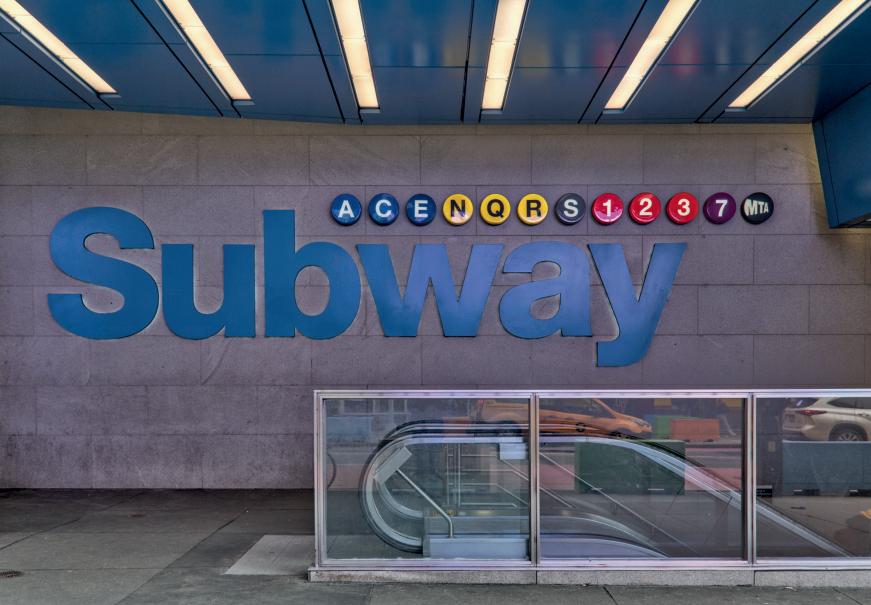
In March 2024, WCFIG staff conducted outreach and training to investigators and other staff of the OfficeoftheMetropolitanTransportationAuthority
InApril2024,theInspectorGeneralandherstaffmet with the Workers’ Compensation Board at a regular meeting in Schenectady, New York to present the 2023 annual report, outlining a number of new initiatives and successes in her second year as the Workers’CompensationFraudInspectorGeneral.
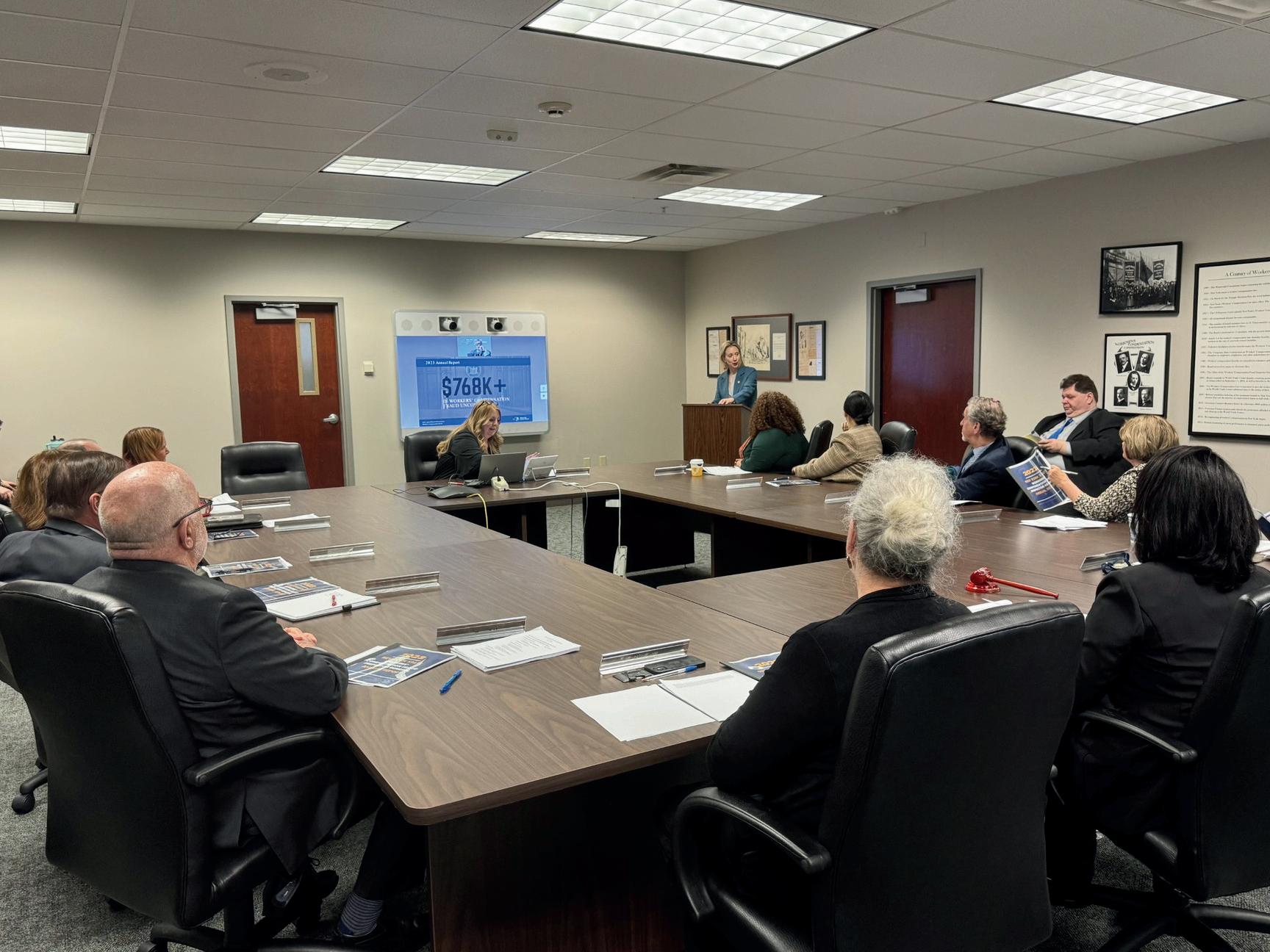

In May 2024, WCFIG staff conducted a presentation regarding identifying and reporting workers’ compensation fraud at the spring conference of the New York State Association of Self-Insured Counties in Oswego, New York.
In June 2024, WCFIG staff presented at the annual joint New York Anti-Car Theft & Fraud Association (NYACT) and National Insurance Crime Bureau (NICB) Workers’ Compensation Fraud Training seminar in Plainview, New York.


In September 2024, WCFIG staff conducted outreach and training to one of the largest private underwriters of workers’ compensation insurance in New York during its annual training convention for employees in Utica, New York.
In October 2024, WCFIG staff partnered with the Workers’ Compensation Board to conduct training at its 2024 Conference at the Empire State Plaza in Albany, New York.

Since her appointment, Inspector General Lang has prioritized transparency as a cornerstone of the office’s mission. This has included the implementation of transformative measures to increase public trust, including the publication of investigative letters, the establishment of social media platforms, and the launch of an open data portal.
Building on this new transparency benchmark, OIG has reimagined its approach to press and public engagement. Our external affairs strategy has ushered OIG into a new era of transparency while maintaining our commitment to the confidentiality required for a thorough and independent investigative process. This has included working to ensure that journalists understand WCFIG’s jurisdiction and how its work to safeguard the workers’ compensation system benefits the state as a whole.
In 2024 alone, Inspector General Lang was interviewed 20 times across major media platforms, including television, print, radio/podcasts, and online publications. Her ongoing media presence has played a critical role in reinforcing the message that fraudulent abuse of the workers’ compensation system—whether by medical professionals, employers, or claimants—will be met with accountability. This visibility not only builds public trust but also serves as a deterrent to potential fraud.
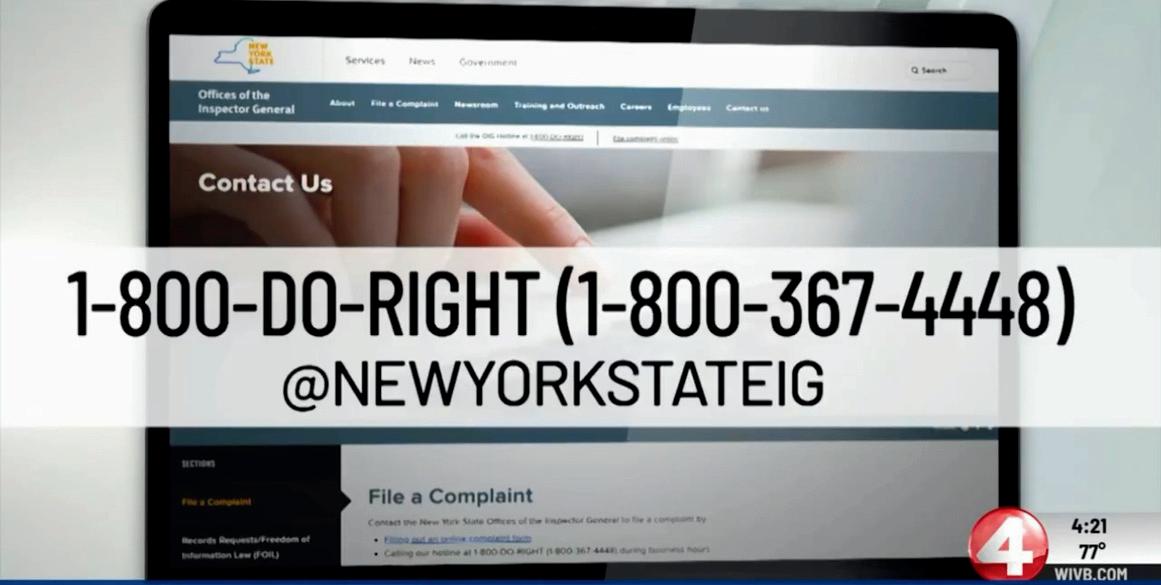

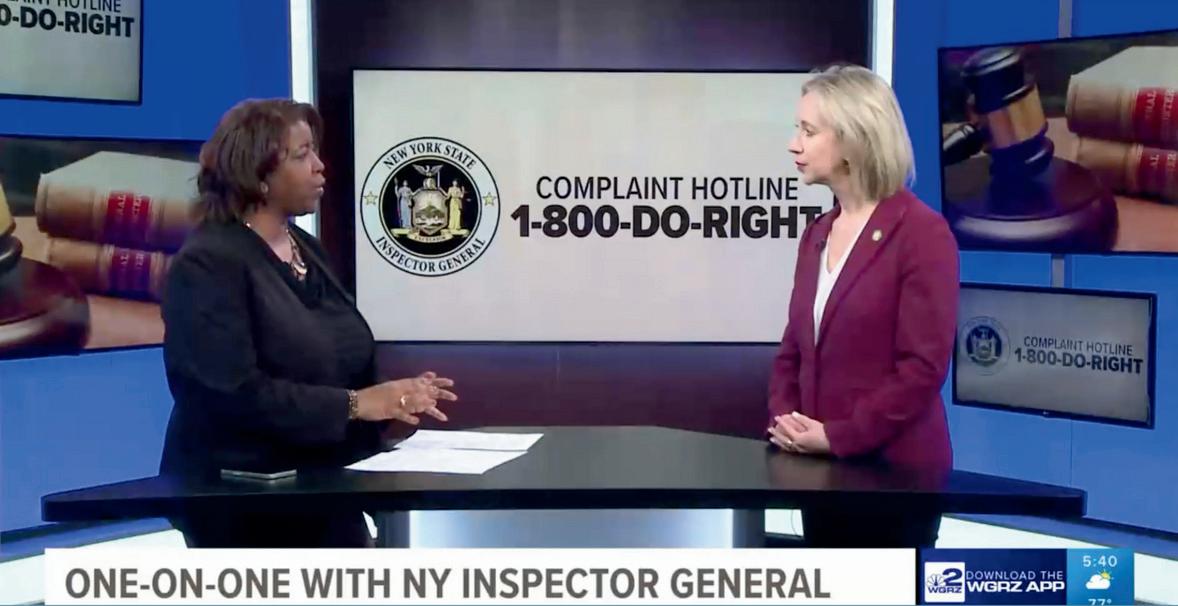
During news interviews and on social media, the Inspector General consistently highlights our hotline, 1-800-DO-RIGHT, and social media handle, @NewYorkStateIG, as ways to report concerns to our office. This emphasis ensures that all New Yorkers know how to reach us and play a role in promoting accountability across the state.
The Inspector General and members of her team have also prioritized both in-person and digital engagement across the state. Through attendance at public events, stakeholder meetings, and more, the office is working to meet New Yorkers where they are—listening to concerns, answering questions, and building trust face-to-face. At the same time, the agency continues to expand its presence on social media, using these platforms to share important case updates, educate the public about fraud prevention, and encourage reporting. Together, these outreach efforts help raise awareness of the agency’s mission, strengthen relationships with communities and law enforcement partners, and ensure that more New Yorkers know how to access OIG. In the year ahead, WCFIG will continue to expand its access across the state through press interviews, the distribution of print materials, and participation in public events, social media, and more.
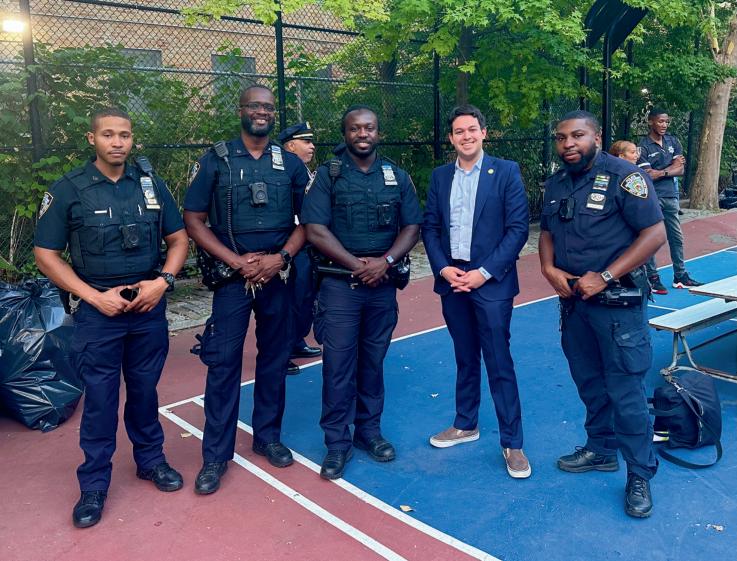
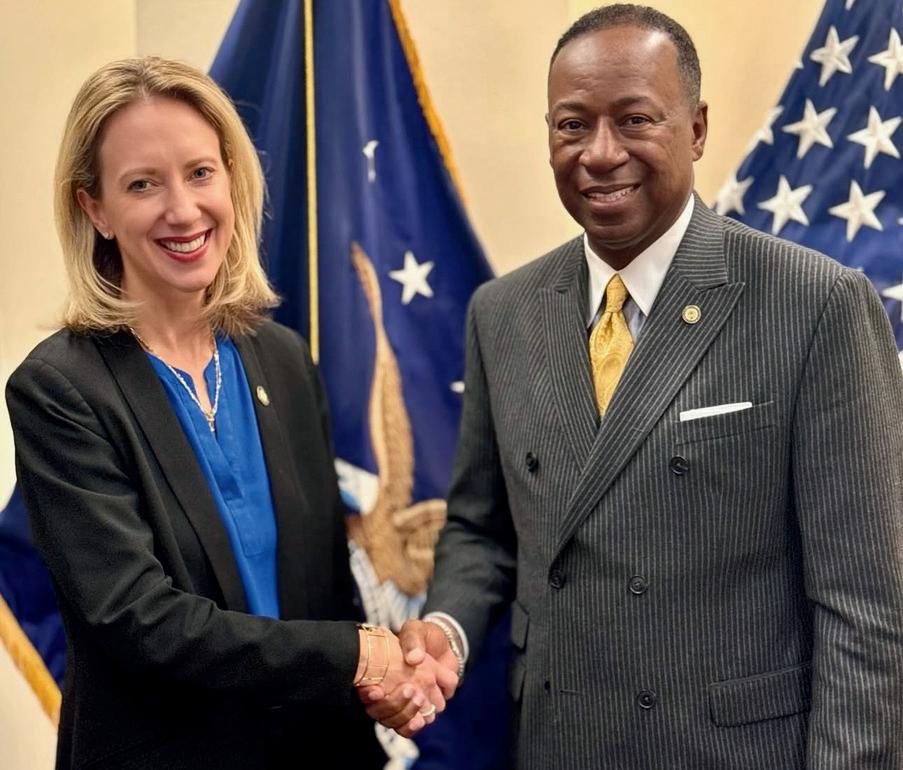

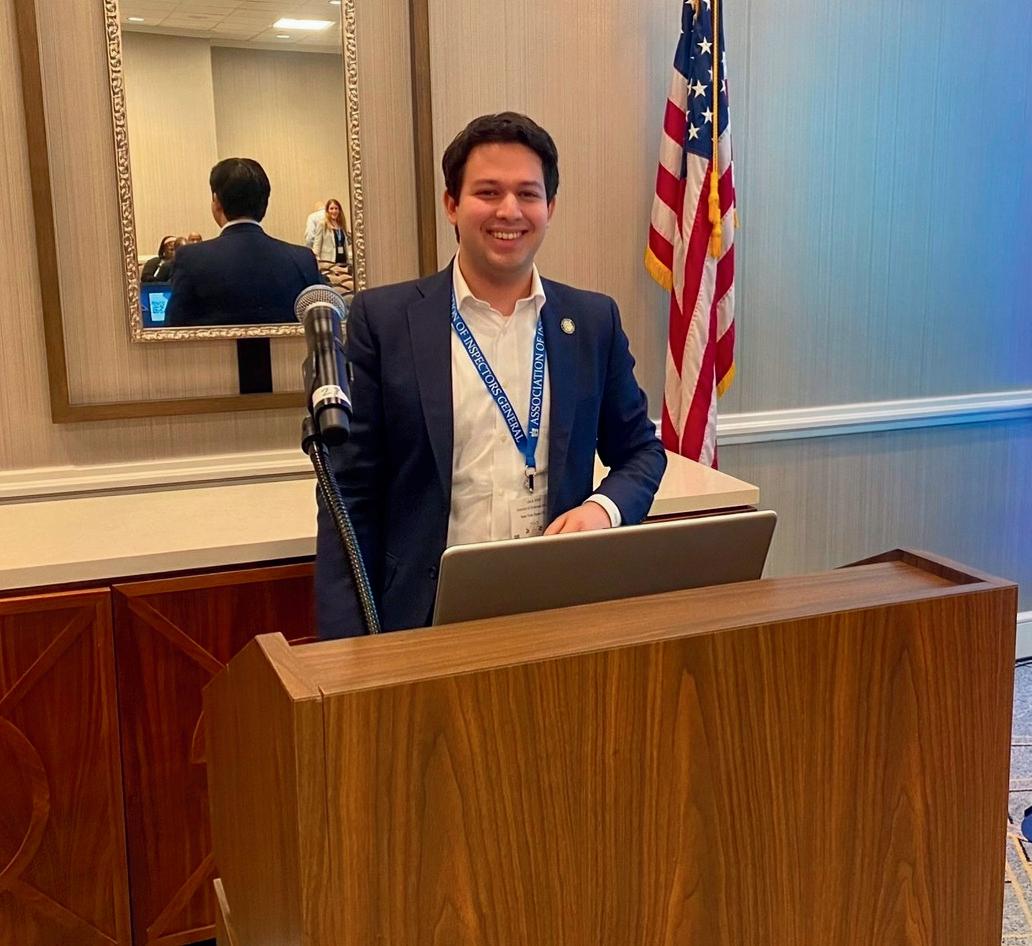

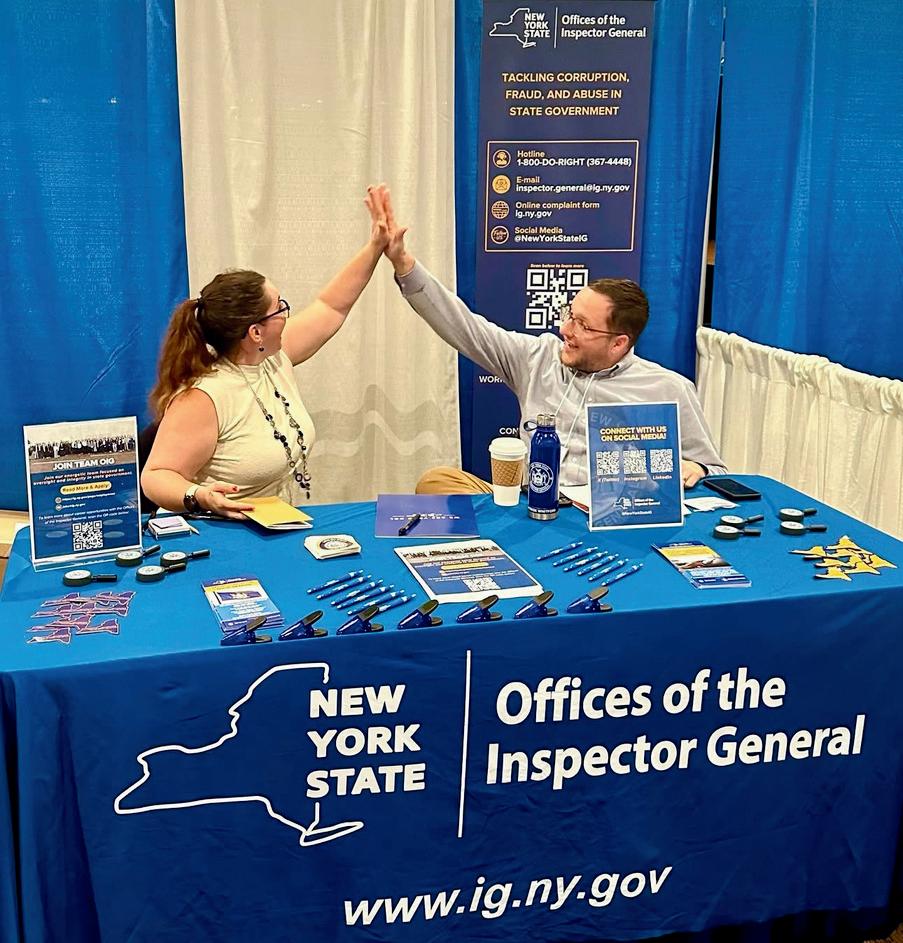
In 2024, WCFIG maintained key partnerships with other investigatory and prosecutorial offices in order to combat workers’ compensation fraud. WCFIG regularly met with representatives of the New York State Insurance Fund to share information and coordinate resources to combat fraud and improve the efficiency and effectiveness of the workers’ compensation system. WCFIG also met with many of the state’s district attorneys, the New York State Attorney General’s Office, and United States Attorneys’ offices to discuss WCFIG’s enhanced oversight and enforcement efforts, as well as to present case referrals.



Throughout 2024, WCFIG continued its participation in the Workers’ Compensation Fraud Task Force, which was created in an effort to reduce workers’ compensation costs in New York State as well as prevent and mitigate accidents, create efficient and effective claims management, and reduce fraud and abuse. WCFIG has been an active participant in this task force since its 2015 inception and meets regularly with its members, including representatives from the New York State Insurance Fund and human resources staff from various state agencies. WCFIG continues to actively pursue numerous investigations arising from its work with this task force.



This past year, WCFIG also continued its collaboration with the Joint Task Force on Employee Misclassification and Worker Exploitation (JTF), which was established in 2016. Employee misclassification adversely impacts the residents, businesses, and economy of New York State by denying employees the full protections of workers’ compensation and unemployment benefits, and places honest employers on an uneven playing field with competitors who do not provide their employees with legally required benefits. Accordingly, the JTF was charged with coordinating the work of state agencies to ensure, TK
among other things, the enforcement of laws that address employer misclassification of workers and the development of legislative proposals and other tools to combat this problem. WCFIG is currently investigating several cases involving employee misclassification. The JTF was suspended during periods of the pandemic but restarted its efforts with the involvement of the Inspector General in 2022, and it remains active to date.


WCFIG also continued its collaboration in 2024 with the New York State Workers’ Compensation Board’s Division of Operations and Compliance Enforcement Unit, which monitors the workers’ compensation insurance coverage of businesses and employers in New York in order to ensure proper coverage for all New York workers in the event of a work-related injury. WCFIG and the Division of Operations and Compliance Enforcement Unit met numerous times in 2024 to combine resources in investigating matters involving fraud perpetrated by employers in New York State.
In addition, WCFIG continued its collaboration with the Workers’ Compensation Board in order to combat fraud committed by healthcare providers complicit in enabling fraud against the workers’ compensation system. Throughout 2024, WCFIG coordinated efforts with the Workers’ Compensation Board’s Office of General Counsel, which oversees healthcare provider discipline, in conjunction with the Office of the Medical Director within the Workers’ Compensation Board. Healthcare providers and physicians must be authorized by the Workers’ Compensation Board in order to treat workers’ compensation patients. Similar to WCFIG’s endeavors with the Workers’ Compensation Board’s Division of Operations and Compliance Enforcement Unit, when a WCFIG investigation involving a medical provider reveals misconduct that does not rise to the level of criminality or is not accepted by a prosecutor for criminal prosecution, WCFIG refers those matters to the Workers’ Compensation Board for appropriate administrative action.
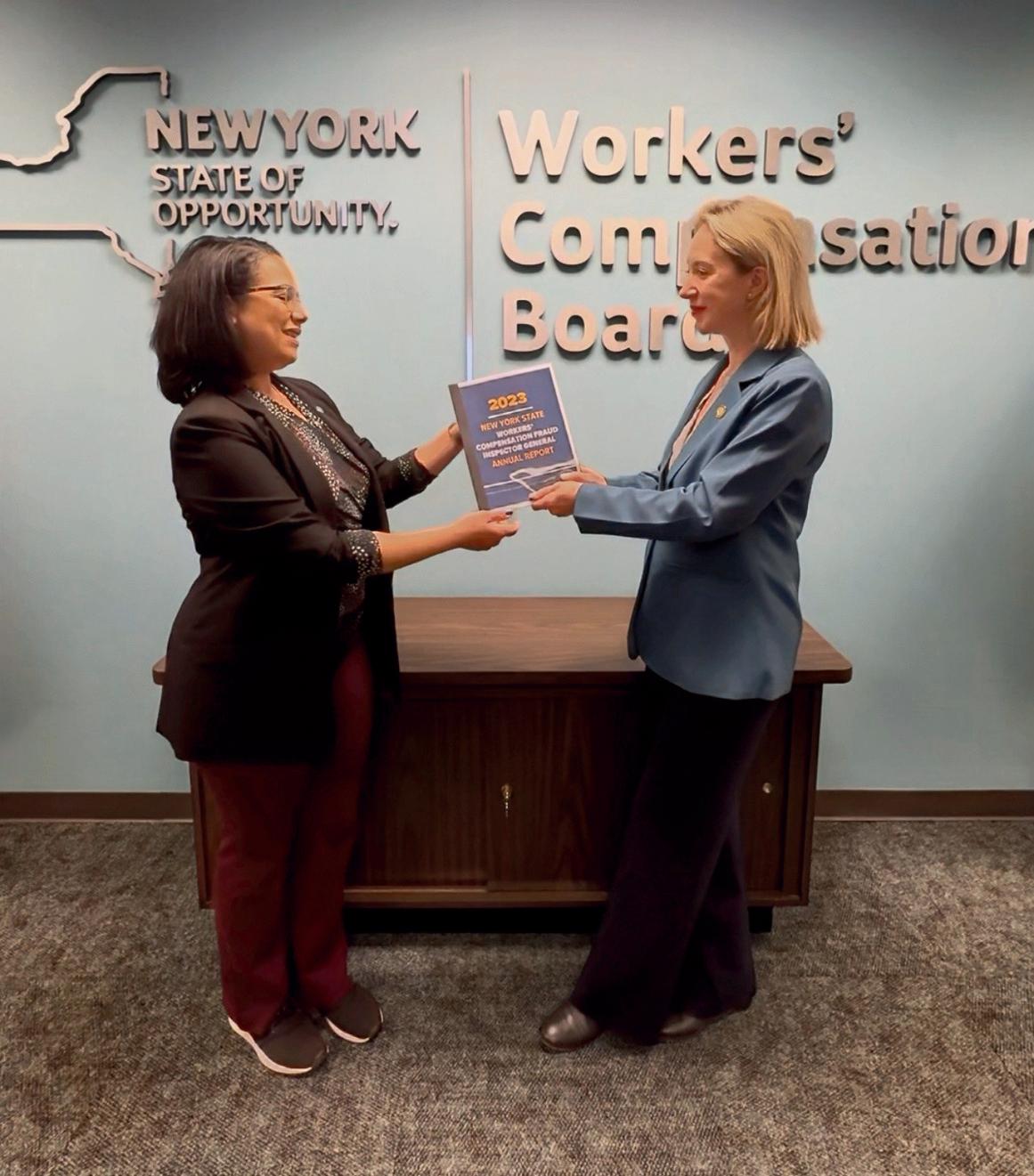
SCHENECTADY, NEW YORK




Throughout 2024, the Inspector General continued in its participation in a joint continuing legal education (CLE) consortium created in 2023. The Consortium, composed of stakeholder organizations including the Workers’ Compensation Board, the New York State Insurance Fund, the Department of Labor, the Board of Industrial Appeals, the Unemployment Insurance Appeals Board and the Offices of the New York State Inspector General, aims to conduct quarterly joint legal education presentations for their combined staffs in an effort to share knowledge of fraud investigations and trends and other expertise relevant to their respective missions.
In November 2024, the Inspector General’s WCFIG Triage team was honored with the prestigious John J. Kennedy Award by the New York Anti-Car Theft and Fraud Association (NYACT). The entire eight member WCFIG Triage team, led by Attorney-In-Charge Bryan Richmond and Managing Investigator Jane Seely, was presented with the award at NYACT’s Annual State Education Conference in Bethpage, New York. The team includes investigators Jackie Desautels, Amy McMullen, Jim Pescetti and Mario Rubino, Investigative Nurse Lisa Lingenfelter and Data Analyst & Forensic Auditor Kaitlyn Gibbons. In its recognition of WCFIG’s years of outstanding work to combat workers’ compensation fraud resulting in more than 100 arrests and the prosecution of more than $19 million in fraud since its inception, NYACT stated that the team:
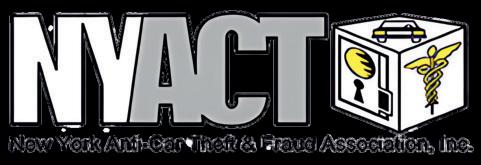

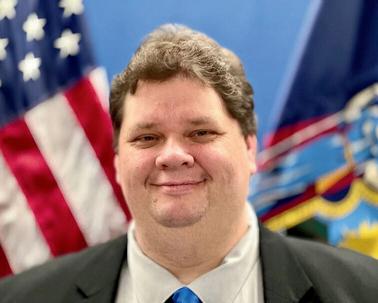

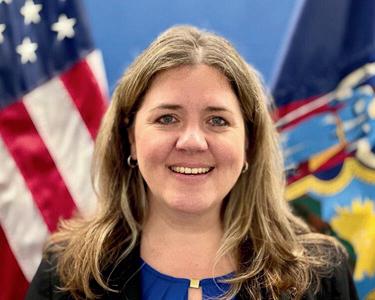
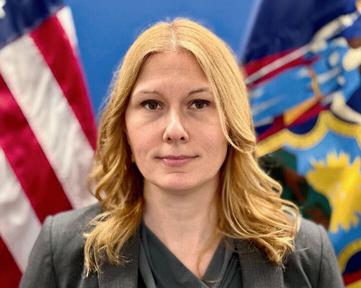


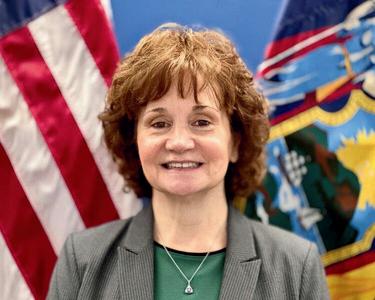
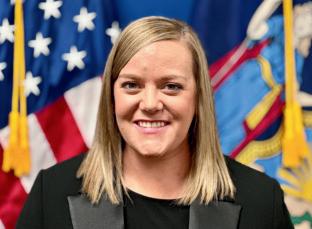
“exemplifies excellence in the fight against insurance fraud” and the profound impact of its investigations “epitomizes the Triage Team’s dedication to ensuring accountability in the Workers’ Compensation System. Their rigorous efforts . . . underscore their vital role in safeguarding the integrity of a system intended to help hardworking New Yorkers.”
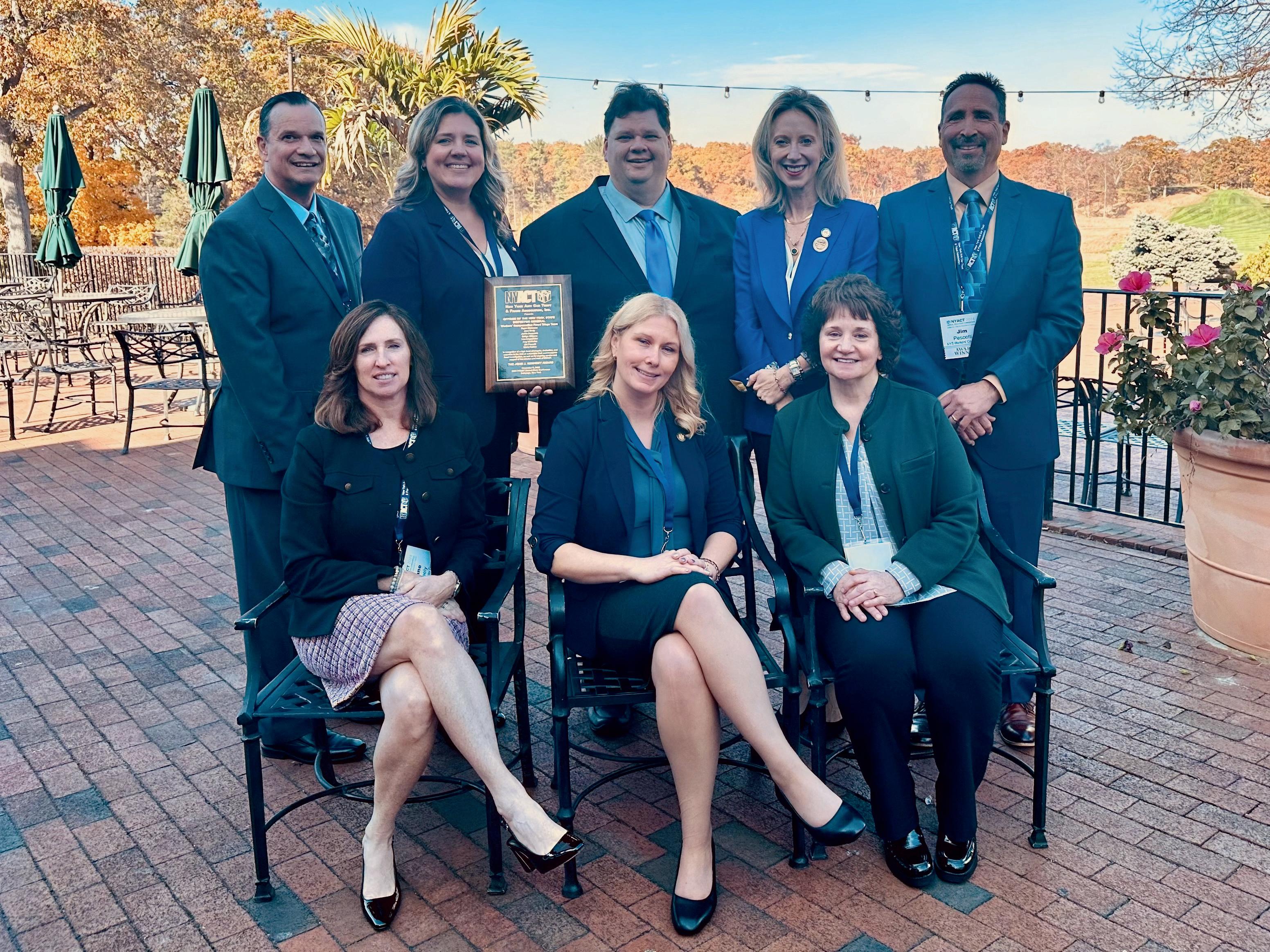
WCFIG Triage Team Members with Inspector General Lucy Lang after being presented with the John J. Kennedy Award by the New York Anti-Car Theft and Fraud Association. TK BETHPAGE, NEW YORK
NYACT was established in 1978 to collaborate with the insurance industry, law enforcement and other interested entities in the fight to reduce the escalating cost of insurance fraud. The Association consists of the insurance industry including self-insurers, law enforcement, and insurance regulatory agencies so that all may share knowledge and cooperate in educational training relating to insurance fraud in New York. The John J. Kennedy Award is presented by NYACT for outstanding service by an individual or team in recognition of the investigation and prevention of insurance fraud. The award is named in honor of J.J. Kennedy, who started his career with the New York City Police Department in 1966, retired as a Detective, and started his second career as a Special Agent with the National Auto Theft Bureau, which later became the National Insurance Crime Bureau (NICB) where he spent the next twenty years.
Read more about the recognition of WCFIG’s outstanding work during the 2024 NYACT Annual Education Conference here: https://bit.ly/NYACTaward
This 2024 WCFIG Annual Report summarizes the office’s anti-fraud activities during the past year. In 2025, WCFIG will continue to promote the integrity of the New York State workers’ compensation system through its investigations, collaborative efforts with other local, state, and federal agencies, training, and outreach. Additionally, WCFIG will continue to engage in proactive initiatives to strengthen the workers’ compensation system and increase the detection, prevention, and prosecution of claimant, employer, and provider/professional fraud. In the years ahead, WCFIG will continue to protect vulnerable workers, prevent fraud, and yield significant savings for New York State.
